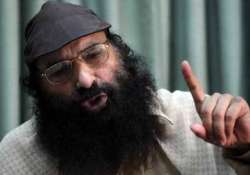Pathankot attack 'routine', not aimed at stalling Indo-Pak talks: Hizbul Chief
New Delhi: In what he calls “a continuation of their activity to target Indian military installations,Hizb-ul Mujahideen chief Syed Salahuddin has taken responsibility for the Pathankot attack.”He also slammed Pakistan Prime Minister Nawaz Sharif's “Kashmir

New Delhi: In what he calls “a continuation of their activity to target Indian military installations,Hizb-ul Mujahideen chief Syed Salahuddin has taken responsibility for the Pathankot attack.”
He also slammed Pakistan Prime Minister Nawaz Sharif's “Kashmir policy”.
The comments are part of Salahuddin's interview on Urdu news portal Wajood.
“While smoothing its relations with India, it (Pakistan) is accountable for considering the emotions and aspirations of the oppressed Kashmiris. You cannot be an advocate of the murdered and a friend of the murderer simultaneously.” he said.
On being asked whether the Pathankot attack was to aimed to stall to stall Indo-Pak talks, the Hizbul commander retorted,"“This perception is cent per cent wrong. Armed Mujahideen are engaged with the eight lakh Indian forces for the last 26 years and each day, Mujahideen are targeting Indian military installations. Pathankot is a continuation of that activity".
Salahuddin resonated similar views speaking at the Press Club in Muzzafarabad, capital of Pakistani-administered part of Kashmir. Police outside the club made no move to arrest him.
"We are at a loss to understand whether they (the Pakistan government) are concerned about the interests of the country that feeds them or that of its enemy?" Salahuddin told a news conference, referring to the government's crackdown," he said.
“While smoothing its relations with India, it (Pakistan) is accountable for considering the emotions and aspirations of the oppressed Kashmiris. You cannot be an advocate of the murdered and a friend of the murderer simultaneously.” salauddin was quoted as saying.
"Pakistan is not only an advocate but also a party to the longstanding Kashmir dispute and therefore the Pakistani people, government and media should play the role of a patron rather than of an adversary."